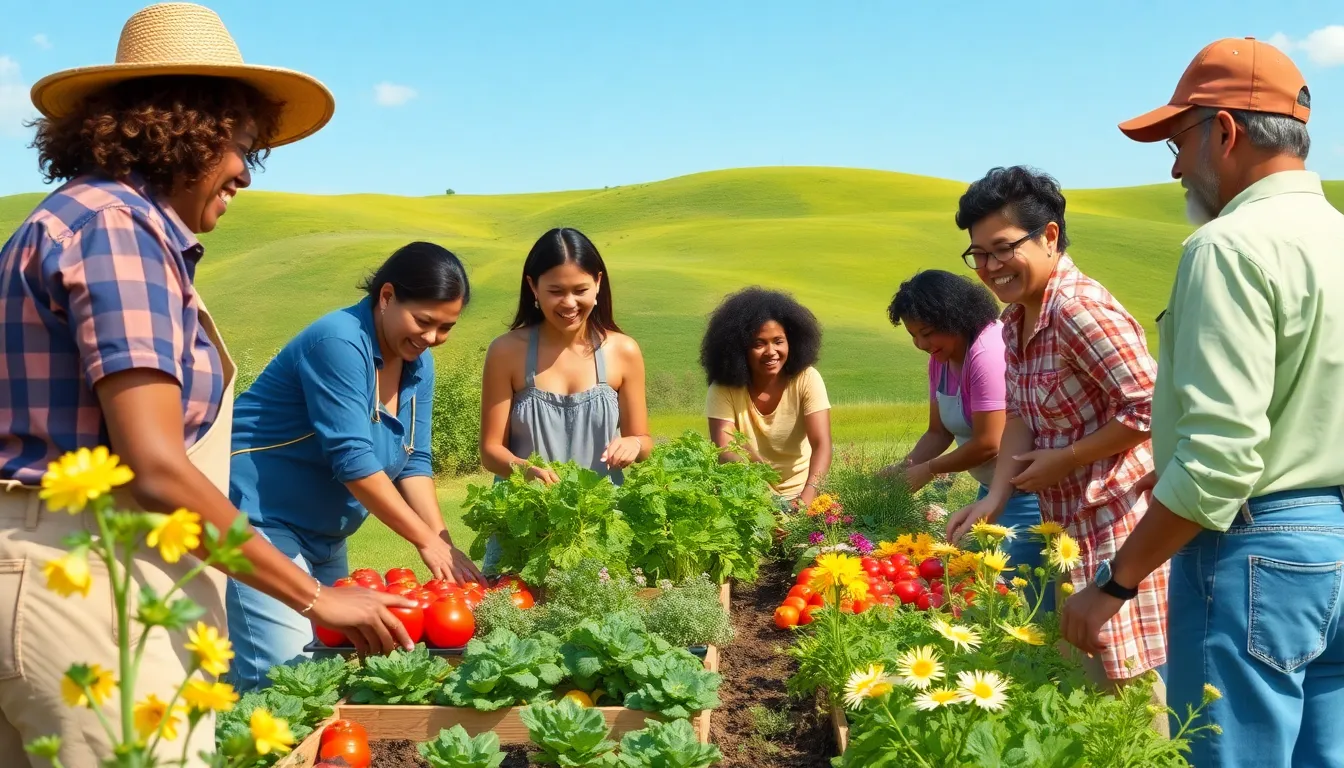In the heart of the Bluegrass State, a quiet revolution is brewing. Kentucky’s sustainable living movement is not just about hugging trees or raising chickens in the backyard—though who wouldn’t want fresh eggs? It’s about embracing a lifestyle that’s as rich as the state’s bourbon and as vibrant as its bluegrass music.
Kentucky Sustainable Living
Kentucky’s sustainable living movement reflects a commitment to environmental stewardship, cultural heritage, and community well-being. Residents embrace practices that promote local farming, conservation, and renewable energy use. Local farmers’ markets showcase fresh produce, while initiatives encourage the purchase of locally sourced food.
Community gardens provide opportunities for residents to grow their own fruits and vegetables, enhancing food security and promoting healthy eating. Many Kentuckians actively participate in recycling programs, reducing waste and protecting natural resources. Green building practices are gaining traction, with energy-efficient homes becoming more common across the state.
Bourbon distilleries increasingly adopt sustainable practices, capturing the essence of conservation within this iconic industry. Land conservation projects aim to protect Kentucky’s rich landscapes and biodiversity. Energy cooperatives encourage the use of solar and wind power, reducing dependence on fossil fuels.
Cultural events often highlight the importance of sustainability, including workshops and festivals focused on environmentally friendly living. Organizations like the Kentucky Conservation Committee unite individuals and groups to further advocacy and education on sustainability. Gardening clubs share knowledge on native plants and sustainable landscaping techniques that benefit local ecosystems.
Educational institutions promote environmental awareness through specialized programs and community outreach. Understanding the interconnectedness of food systems, energy consumption, and cultural traditions strengthens Kentucky’s approach to sustainable living. This multifaceted movement illustrates the dedication of Kentuckians to creating a vibrant future rooted in sustainability.
Benefits of Sustainable Living in Kentucky

Sustainable living in Kentucky offers numerous advantages that elevate the state’s quality of life. Residents experience positive changes in their communities and environments.
Environmental Impact
Implementing sustainable practices helps preserve Kentucky’s natural resources. Clean air and water quality improve as communities adopt renewable energy solutions. Wildlife habitats benefit from conservation efforts, allowing biodiversity to thrive. Reducing waste through recycling programs lessens landfill loads and mitigates pollution. Community gardens enhance local ecosystems while promoting organic farming. Residents cultivate an awareness of their ecological footprint, fostering a culture of stewardship.
Economic Advantages
Sustainable living often translates into economic growth for Kentucky. Local farmers’ markets create direct sales channels, supporting regional agriculture. Businesses that adopt green practices reduce operational costs through energy efficiency. Job creation occurs in renewable energy sectors, such as solar and wind. Increased investment in sustainable infrastructure leads to long-term economic resilience. Communities saving on utility bills through energy conservation initiatives strengthen household budgets. Empowering local economies through sustainable choices leads to a healthier financial future.
Practices for Sustainable Living in Kentucky
Kentucky residents engage in various practices that promote sustainable living. These methods highlight the state’s commitment to environmental stewardship.
Local Farming and Agriculture
Local farming plays a crucial role in Kentucky’s sustainable movement. Farmers prioritize organic methods that reduce chemical use and enhance soil health. Community-supported agriculture (CSA) initiatives offer residents fresh produce while supporting local farms. Furthermore, farm-to-table restaurants encourage diners to embrace local ingredients, fostering economic growth. Embracing these practices strengthens community ties and cultivates awareness of food origins.
Renewable Energy Sources
Kentucky’s shift to renewable energy reflects growing environmental consciousness. Solar energy adoption increases among homes and businesses, offering sustainable alternatives to traditional power sources. Wind energy projects also expand, harnessing the state’s natural resources efficiently. Many residents take advantage of tax incentives for renewable energy installations, promoting energy independence. By investing in these sources, Kentuckians enhance their energy security and contribute to a sustainable future.
Community Initiatives and Resources
Kentucky’s commitment to sustainable living is evident through various community initiatives and resources aimed at fostering a greener future.
Local Organizations and Programs
Local organizations play a critical role in promoting sustainable practices across Kentucky. The Kentucky Sustainable Agriculture Association energizes farmers to adopt environmentally friendly techniques. Programs like the Louisville Metro Government’s Green Business Program assist businesses in reducing their carbon footprints. Community-supported agriculture (CSA) initiatives strengthen ties between consumers and local farmers, emphasizing the importance of fresh, locally sourced food. The Bluegrass Greensource provides resources for schools and communities, focusing on conservation and energy efficiency. Land trusts across the state work tirelessly to protect natural habitats, ensuring the preservation of Kentucky’s unique landscapes.
Educational Opportunities
Educational opportunities abound for those interested in sustainable living in Kentucky. The University of Kentucky offers various programs focused on sustainable agriculture, environmental science, and renewable energy. Community workshops provide hands-on training in gardening and energy conservation. Local organizations frequently host events to raise awareness about sustainability practices. Residents can engage in educational seminars covering topics like waste reduction and composting. Many schools incorporate sustainability into their curricula, teaching students the significance of environmental stewardship. By prioritizing education in sustainability, Kentucky empowers its citizens to take informed actions for a better future.
Conclusion
Kentucky’s sustainable living movement is a testament to the state’s commitment to preserving its unique culture and environment. By embracing practices that enhance community well-being and promote ecological balance, residents are forging a path toward a more sustainable future. The integration of local agriculture, renewable energy, and cultural heritage creates a vibrant ecosystem that benefits both people and the planet.
As Kentuckians continue to support local initiatives and educate themselves about sustainable practices, they contribute to a legacy of stewardship that will resonate for generations. This dedication not only enriches their lives but also strengthens the bonds within their communities, ensuring a healthier and more resilient Kentucky for all.

